We may not have the course you’re looking for. If you enquire or give us a call on +91-181-5047001 and speak to our training experts, we may still be able to help with your training requirements.
Training Outcomes Within Your Budget!
We ensure quality, budget-alignment, and timely delivery by our expert instructors.
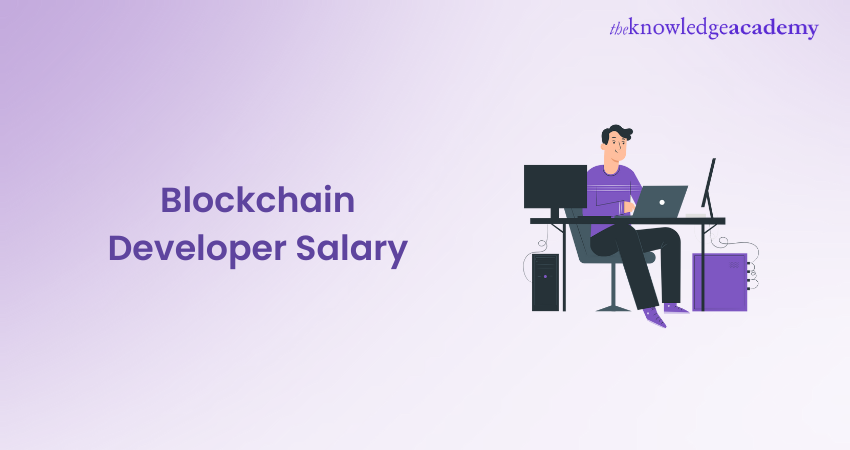
The world of Technology evolves at rapid pace, and Blockchain Developers are currently in the driver's seat of innovation. From building secure systems and decentralised finance to crafting smart contracts, these experts are rewriting the rules of digital trust. But have you ever wondered how much salary these tech rockstars command? This blog provides a detailed breakdown of the Blockchain Developer Salary based on industry, location, and experience. Dive in and learn why Blockchain Development is your ticket to premium rewards in today's tech economy!
Table of Contents
1) Who are Blockchain Developers?
2) Primary Responsibilities of a Blockchain Developer
3) Skills Required to Become a Blockchain Developer
4) Blockchain Developer Salary Across Industries
5) Blockchain Developer salary Based on Location
6) Blockchain Developer Salary Based on Experience
7) Conclusion
Who are Blockchain Developers?
Qualified software engineers known as Blockchain Developers design, construct, and manage Blockchain systems. Their knowledge is essential for building distributed, transparent, and safe digital ledgers, which support smart contracts, cryptocurrencies, and other uses. They create smart contracts, Blockchain procedures, and Decentralised Apps (DApps).
These engineers are proficient coders who also understand the fundamentals of cryptography and Blockchain platforms like Ethereum and Bitcoin. They play an essential part in different areas, including as supply chain management, healthcare, and banking, where they use Blockchain technology to improve efficiency, security, and transparency.
Primary Responsibilities of a Blockchain Developer
The primary responsibilities of a Blockchain Developer are the following:
1) Designing Blockchain Protocols:
a) Blockchain Developers create the fundamental rules and structure for Blockchain systems.
b) These protocols define how data is stored, verified, and secured within the network.
2) Developing Smart Contracts:
a) These are code-based agreements that are automatically executed.
b) These contracts are designed and deployed by Blockchain engineers, allowing automated procedures to take place without the need of intermediaries.
3) Building Decentralised Applications:
a) DApps operate on Blockchain networks instead of centralised servers.
b) Developers create DApps that use Blockchain features to ensure security and efficiency.
4) Maintaining Blockchain Networks:
a) Ensuring the Blockchain system remains secure, functional, and scalable.
b) Regular maintenance and updates are crucial.
5) Implementing Cryptographic Security Measures:
a) Developers use advanced cryptographic techniques to protect data.
b) Encryption, hashing, and digital signatures enhance security.
6) Collaborating with Teams:
a) Blockchain Development involves teamwork.
b) Developers work with designers, stakeholders, and other experts to integrate Blockchain solutions.
7) Troubleshooting and Debugging:
a) Identifying and fixing issues within Blockchain applications.
b) Ensuring performance and security.
8) Staying Updated with Industry Trends:
a) Continuous learning about new developments in Blockchain technology.
b) Applying innovative solutions to real-world challenges.
Skills Required to Become a Blockchain Developer
A Blockchain Developer's salary depends on their skills. The primary Blockchain Developer skills required are as follows:
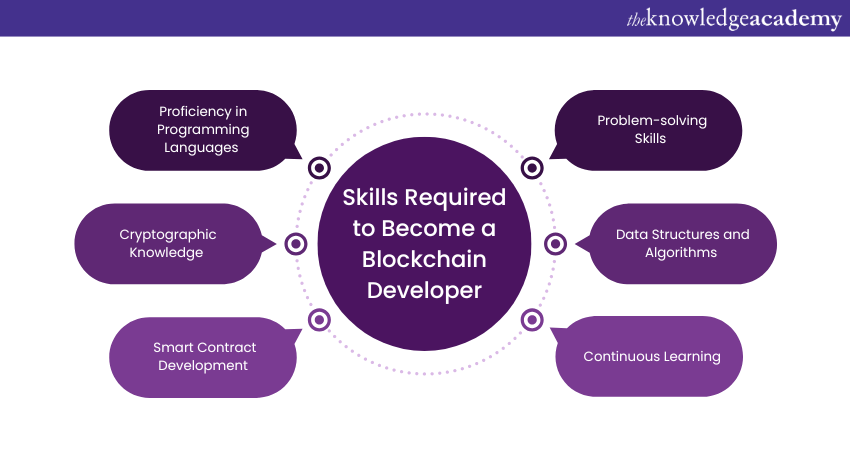
a) Knowledge of languages such as Solidity, C++, Python, and JavaScript is essential
b) Familiar with platforms like Ethereum, Hyperledger, and Bitcoin
c) Understanding cryptographic principles and techniques to make sure data security
d) Ability to write and deploy smart contracts
e) Understanding how decentralised networks operate
f) Ability to design innovative solutions to complex problems
g) Skills to evaluate and enhance Blockchain systems effectively
h) Familiarity with Data Structures and algorithms
i) Precision in coding and system design to avoid vulnerabilities
j) Keeping up to date with the latest Blockchain technologies and trends
Become an Ethereum Developer with our Ethereum Developer Training and master Blockchain Technology today!
Blockchain Developer Salary Across Industries
This table outlines the annual average Blockchain Developer Salary across industries:
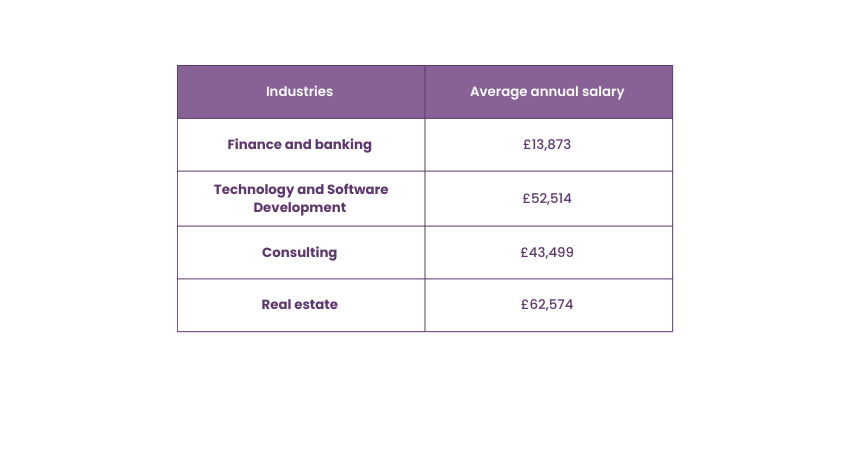
Source: Glassdoor
1) Finance and banking:
a) Average annual salary: £13,873
b) In the finance and banking industry, Blockchain Developers build secure and transparent systems for transactions. They also create solutions for digital payments and managing assets.
c) Their expertise enhances security, reduces fraud, and streamlines financial operations.
2) Technology and Software Development:
a) Average annual salary: £52,514
b) In technology and Software Development, Blockchain Developers integrate Blockchain solutions.
c) They focus on improving data security, creating Decentralised Applications, and developing new Blockchain websites and tools.
3) Consulting:
a) Average annual salary: £43,499
b) Blockchain Consultants provide expert advice to organisations on implementing customised Blockchain solutions.
c) They help clients understand and adopt Blockchain technology effectively across various industries.
4) Real Estate:
a) Average annual salary: £62,574
b) In the real estate industry, Blockchain Developers create platforms for transparent property transactions.
c) They ensure secure record-keeping and streamline processes related to buying, selling, and leasing properties.
Enhance your skills in Bitcoin and Cryptocurrency by registering for our Bitcoin and Cryptocurrency Course now!
Blockchain Developer Salary Based on Location
This table outlines the average annual salaries for different countries in the field of Blockchain Developers:
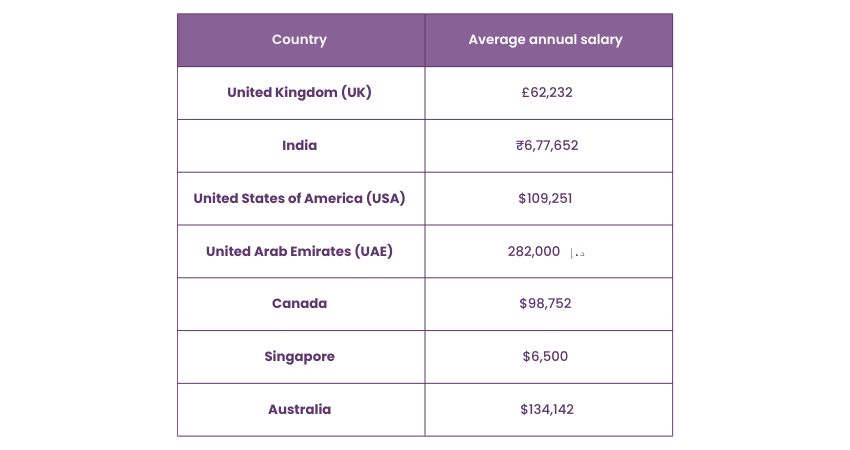
Source: Glassdoor
1) United Kingdom (UK): The average annual salary for Blockchain Developers is £62,232. This reflects the high demand for their specialised skills in a competitive market.
2) India: The average annual salary for Blockchain Developers is ₹6,77,652. Despite being lower than in many Western countries, this is a substantial salary in the Indian job market, highlighting the growing importance of Blockchain technology.
3) United States of America (USA): The average annual salary for Blockchain Developers is $109,251, highlighting the advanced and competitive tech industry in the country.
4) United Arab Emirates (UAE): The average annual salary for Blockchain Developers is AED 282,000, showing the region's strong focus on innovative technologies and digital transformation.
5) Canada: The average annual salary for Blockchain Developers is $98,752. The strong tech industry in Canada supports these competitive salaries.
6) Singapore: The average annual salary for Blockchain Developers is $6,500. This figure likely reflects monthly earnings, indicating a robust annual income when multiplied.
7) Australia: Blockchain Developers earn an average annual salary of $134,142. This high salary underscores the value placed on tech professionals in the Australian market.
Blockchain Developer Salary Based on Experience
This table outlines the average annual salaries based on experience-level of Blockchain Developers:
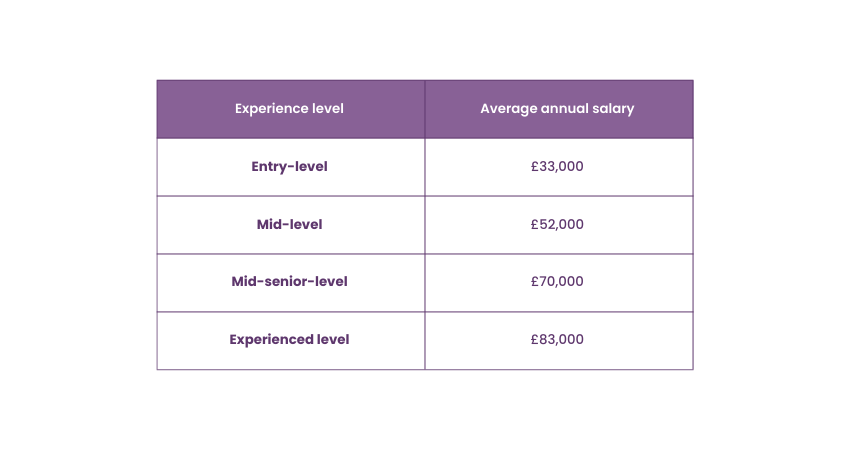
Source: Glassdoor
1) Entry-level: The average yearly salary for someone new to this industry is £33,000. These developers are only beginning to acquire expertise and knowledge.
2) Mid-level: The average yearly salary for developers with a few years of expertise is £52,000. They are more knowledgeable about Blockchain technology and its uses.
3) Mid-senior-level: The average annual salary for professionals in this category is £70,000. They regularly take on leadership responsibilities and manage complicated projects because of their vast knowledge.
4) Experienced Level: The average annual salary for experienced Blockchain Developers is £83,000. They are in high demand for managing complex projects and encouraging technological advancement due to their advanced talents.
How to Become a Highly Paid Blockchain Developer
Technical skills, Industry knowledge, and passion for decentralised technologies is essential to become a highly paid Blockchain Developer. You can accomplish it by following these steps:
1) Understand the Opportunity: Recognise the potential of Blockchain Development as it's a rapidly growing industry with high demand and the ability to command six-figure incomes. Explore various use cases for Blockchain, including NFTs (Non-Fungible Tokens), DeFi (Decentralised Finance), gaming, and Web 3.0.
2) Learn the Fundamentals: Begin with the basics of Blockchain technology through concepts like decentralisation, censorship resistance, and transparency. Dive into the principles that enable various applications of Blockchain.
3) Choose Your Path: Decide on the type of Blockchain Developer you want to be because there are many exciting options, such as Smart Contract Developer, Web 3.0 Developer, Crypto Gaming Developer and Metaverse Developer.
4) Master Relevant Skills: You must master the Programming Languages, frameworks, and tools relevant to your chosen path, such as Solidity, Web3.js and Truffle.
5) Build a Portfolio: Participate in projects to showcase your skills, such as building your own DApps, writing smart contracts, and contributing to open-source initiatives. Collaborating with other developers and participating in hackathons or coding challenges is a great way to build a strong portfolio.
6) Stay Updated: The Blockchain landscape evolves rapidly, so you must stay informed about the latest protocols, trends, and technologies. Attend conferences, follow industry blogs, and keep engaging with the community.
Conclusion
Knowing what the Blockchain Developer Salary looks like across different industries, locations and experience levels is essential. It will help you pinpoint your potential earnings and career prospects in this rapidly evolving field. With sky-high demand for this specialised skill, a career as a Blockchain Developer provides both lucrative opportunities and significant growth potential.
Become a Blockchain expert by registering for our comprehensive Blockchain Course and transform your career!
Frequently Asked Questions

Becoming a Blockchain Developer requires time, energy, and patience. You can start with an entry-level course like Introduction to Blockchain Technologies and then build your skill set through courses, certifications, or a computer science degree.

Yes. People with no background in IT can learn Blockchain. Sign up for a good course and get yourself certified. Invest enough time into learning and practising the skills. Contact your mentors to clarify your doubts and build a strong foundation.

The Knowledge Academy takes global learning to new heights, offering over 30,000 online courses across 490+ locations in 220 countries. This expansive reach ensures accessibility and convenience for learners worldwide.
Alongside our diverse Online Course Catalogue, encompassing 17 major categories, we go the extra mile by providing a plethora of free educational Online Resources like News updates, Blogs, videos, webinars, and interview questions. Tailoring learning experiences further, professionals can maximise value with customisable Course Bundles of TKA.

The Knowledge Academy’s Knowledge Pass, a prepaid voucher, adds another layer of flexibility, allowing course bookings over a 12-month period. Join us on a journey where education knows no bounds.

The Knowledge Academy offers various Blockchain Courses, including Blockchain Course, Bitcoin and Cryptocurrency Course, and the Ethereum Developer Course. These courses cater to different skill levels, providing comprehensive insights into various Interesting Blockchain Facts.
Our Advanced Technology Blogs cover a range of topics related to Blockchain , offering valuable resources, best practices, and industry insights. Whether you are a beginner or looking to advance your Blockchain knowledge, The Knowledge Academy's diverse courses and informative blogs have you covered.







 Top Rated Course
Top Rated Course




 If you wish to make any changes to your course, please
If you wish to make any changes to your course, please


